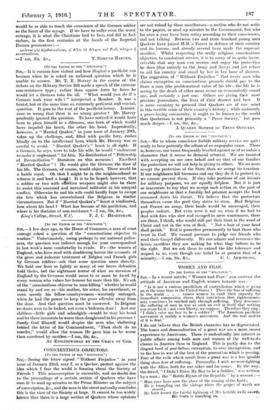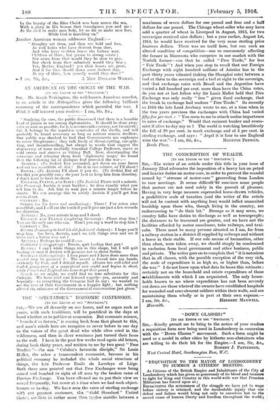WOMEN AND FEAR.
[TO THE EDITOR OF THE " SPECTATOR:A 8111,-111'a recent article, " Women and Fear." you contrast the attitude of American and English women towards war :— " Is it not a curious parallelism of contradiction which is gong on at the same time in the United States ? There the fear of suffering in the world . . . causes women to exalt their capacity for immediate compassion above their conviction that righteousness may sometimes be reached only through suffering. They denounce the suffering of men in war as such an evil in itself that nothing can atone for it—not even liberty, we suppose. Therefore they sin? : ' I didn't raise my boy to be a soldier ! The American pacifieist movement is mainly a women's movement. And the real motive of it is fear."
I do not believe that the British character has so degenerated. The losses and demoralization of a great war aro a more recent experience to Americans. There is undoubtedly less interest in public affairs among both men and women of the well-to-do classes in America than in England. This is partly due to the disgust bred of post-bellurn corruption, to over-immigratiou, and to the loss in war of the best of the generation which is passing.- Fear of the evils which result from a- great war is a less ignoble thing than fear of suffering. Personally, I wish we were fighting with the Allies, both for our sakes and for yours. By the way, the drivel, " I Didn't Raise My Boy to be a Soldier," was written by a man ; the " Battle Hymn of the Republic " by a woman : " Mine eyes have seen the glory of the coming of the Lord ; He is trampling out the vintage where the grapes of wrath are stored ; He hath loosed the fateful lightning of His terrible swift swords
His truth is marching on. . -
In the beauty of the lilies Christ was born across the sea, With a glory in His bosom that transfigures you and me : AS He died to make men holy, let us die to make men free, While God is marching on."
Another American woman addresses England :-
"haughty art thou, and they are bold and free, As well befits who have descent from thee, And who have trodden brave the forlorn way. hildren of thine, but grown to strong estate ; Nor scorn from thee would they be slow to pay, Nor cheek from thee submissly would' they bear ; Yet, Mother England ! yet their hearts arc great,
And if for thee should dawn some darkest day, At cry of thine, how nroudly would they dare !"



































 Previous page
Previous page